
Teachers took to the streets on Wednesday evening at three locations in Davis – Mace and Chiles, Covell and Pole Line, and 5th and B. Teachers have been pushing for pay increases to close a compensation gap with other school districts, and many have warned that they are being priced out of Davis.
Davis Teachers Association President Dianna Huculak explained to the Vanguard, “The purpose of this action is to raise community awareness about our issues, about contract negotiations so that the community at large has an understanding about what’s going on.”
The teachers remain in contract negotiations, she told the Vanguard.
“So far we are not happy with their proposals,” she explained. “They offered one percent one time and two percent another time, but nothing ongoing.”
At this point, Ms. Huculak explained, the district’s offers have not “really addressed the five percent wage gap that they’ve identified.” The one-time wage hike would operate “like a bonus.
“One percent is basically $450, everybody would get a $450 check. But that doesn’t go onto salary schedule so it has no impact on retirement or wages over time.”
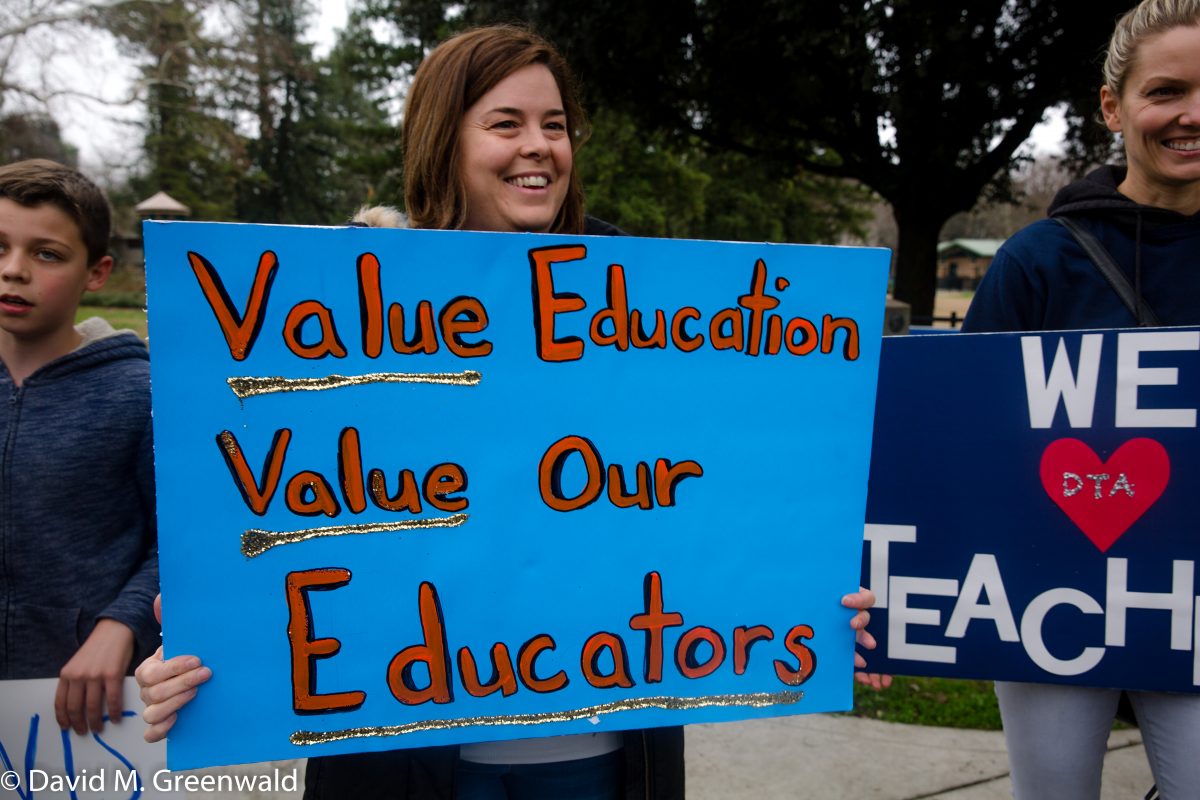
Ms. Huculak noted, “We are definitely talking about a parcel tax right, but I think the district doesn’t feel that it has money to offer teachers even though they have ongoing money coming in both from LCFF [Local Control Funding Formula] as well as ongoing funds SELPA [Special Education local Planning Area], because they’ve been overpaying for SELPA and getting things and money returned.
“There’s definitely new money coming in that they could dedicate to teachers’ salaries but they don’t seem to want to do that,” she said.
Maria Clayton, DJUSD spokesperson, told the Vanguard, “There is a passion for public education in Davis and that is because of the quality of the educators in our community. Our employees are the heart of our organization and the relationships they build with students make a difference every day.”
She acknowledged the compensation gap, noting, “In Davis, we have a compensation gap; this is no secret. Because we value our employees, we are committed to closing this regional compensation gap for our employees. This commitment has been explicitly stated in public by the Board of Education and is embedded in our Strategic Plan.”
She blamed the gap primarily on the state funding system and LCFF, which she said disadvantages Davis.
“The employee compensation gap is a result of a state funding model that has disadvantaged Davis,” said Ms. Clayton. “We receive below average funding—about 87% of the state average for a unified school district. What this means is that we have less money than our regional neighbors to do the things we need to do. With growing pensions costs, a looming teacher shortage and little change on the horizon in the state funding formula, we need alternatives to raise revenue and/or reprioritize expenditures in order to increase employee compensation.”
The district is looking to accomplish this closure of the wage of gap without cutting programs.
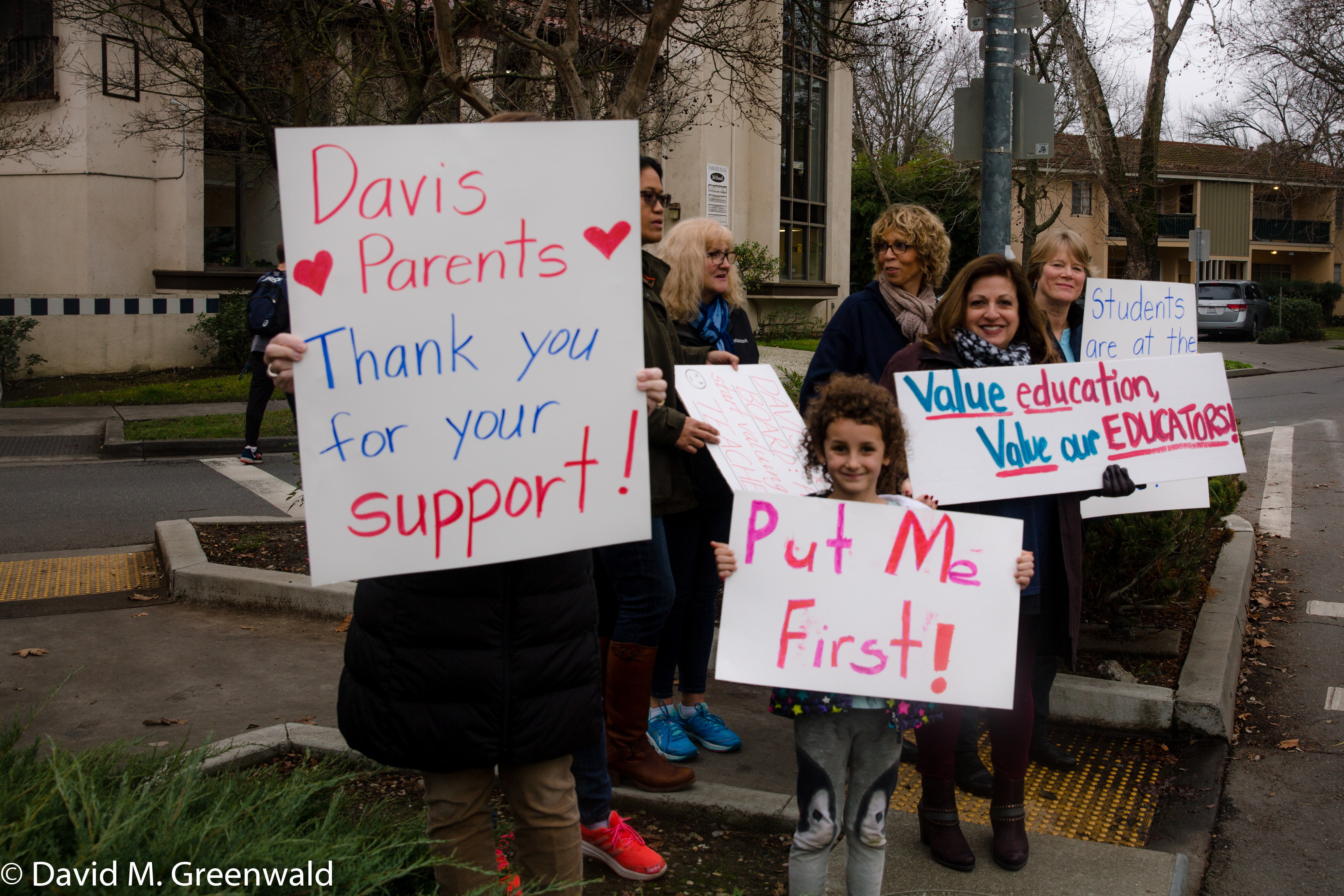
Said Maria Clayton: “It is because we value our employees that we don’t want to cut the robust programs or the people associated with those programs that have come to define and differentiate a Davis education.
“The Board of Education is currently discussing an ongoing parcel tax for Employee Compensation as a possible item for the November 2018 ballot, to raise the funds required to close the regional compensation gap. Polling on this item will likely occur at the beginning of February,” she said. The public can learn more about how DJUSD is prioritizing employee compensation at www.djusd.net.
This evening, the school board is looking to provide direction to the district to push for legislative sponsorship of changes to the parcel tax laws.
The district will be looking to possibly clarify California statutes in the Education Code that would allow parcel taxes to be placed on the ballot by “registered voters just as city and county voters can do and which is meant to take advantage of the California Supreme Court’s recent City of Upland court case, that clarified the voting threshold for such measures are a majority vote.”
In addition, they are looking at adding a parcel tax exemption for school district employees. “This idea would allow a district to provide incentives to work and live in the community they teach in and make housing more affordable,” the district said.
Finally, they would ask to allow “school districts with parcel taxes to require inter-district transfer students to pay the annual parcel tax to the district.”
In the meantime, the action on Wednesday drew from a broad and large audience.
“These are teachers,” she said, with a mix of parents and students well. “Three different locations across Davis just to help spread the awareness, but these are people that are concerned about schools in Davis. There’s a teaching shortage, our salary schedule isn’t competitive, so we lose a lot of teachers every year which ultimately impacts education for children.”
—David M. Greenwald reporting


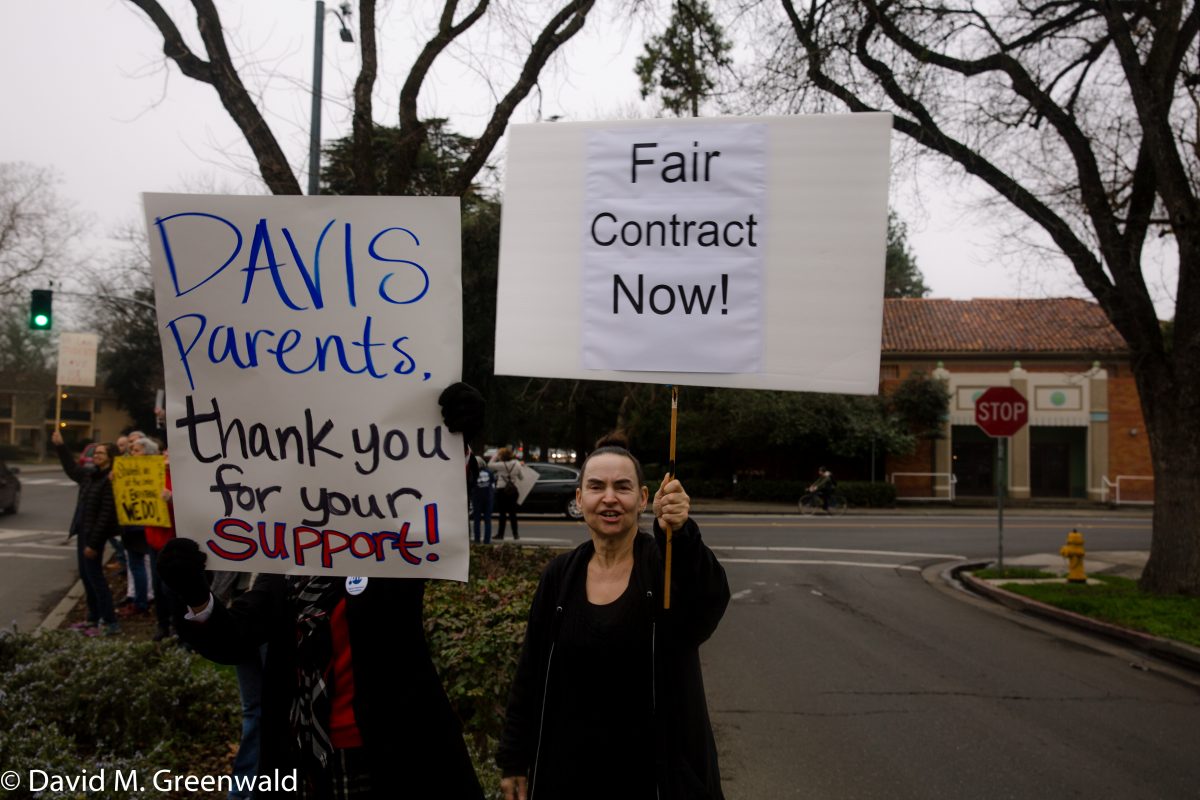
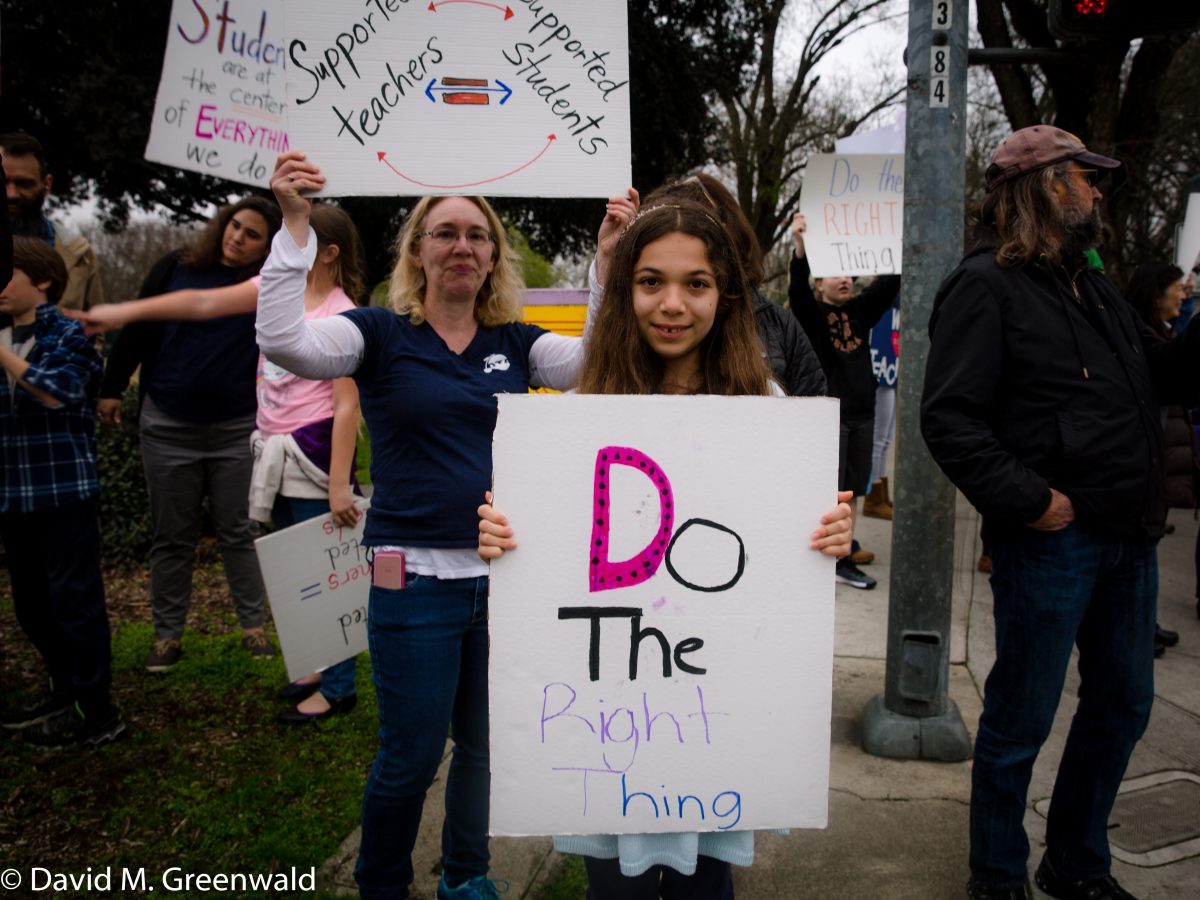

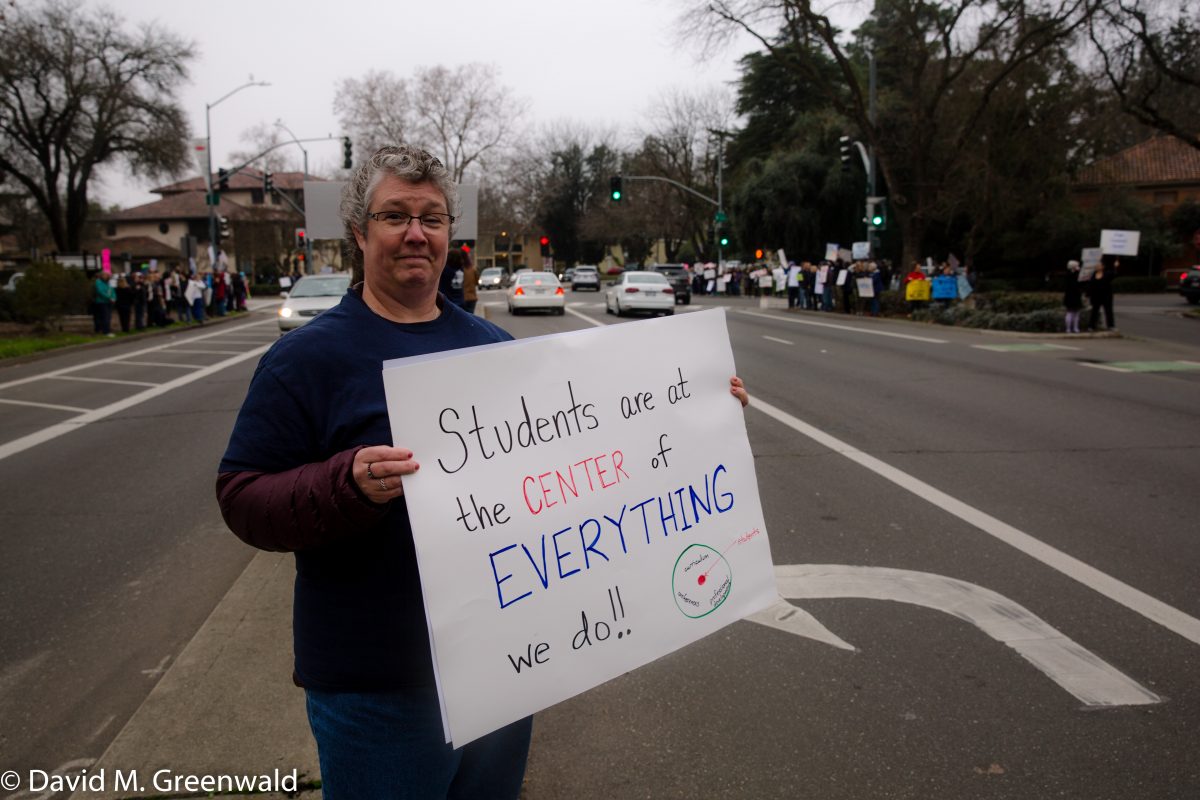
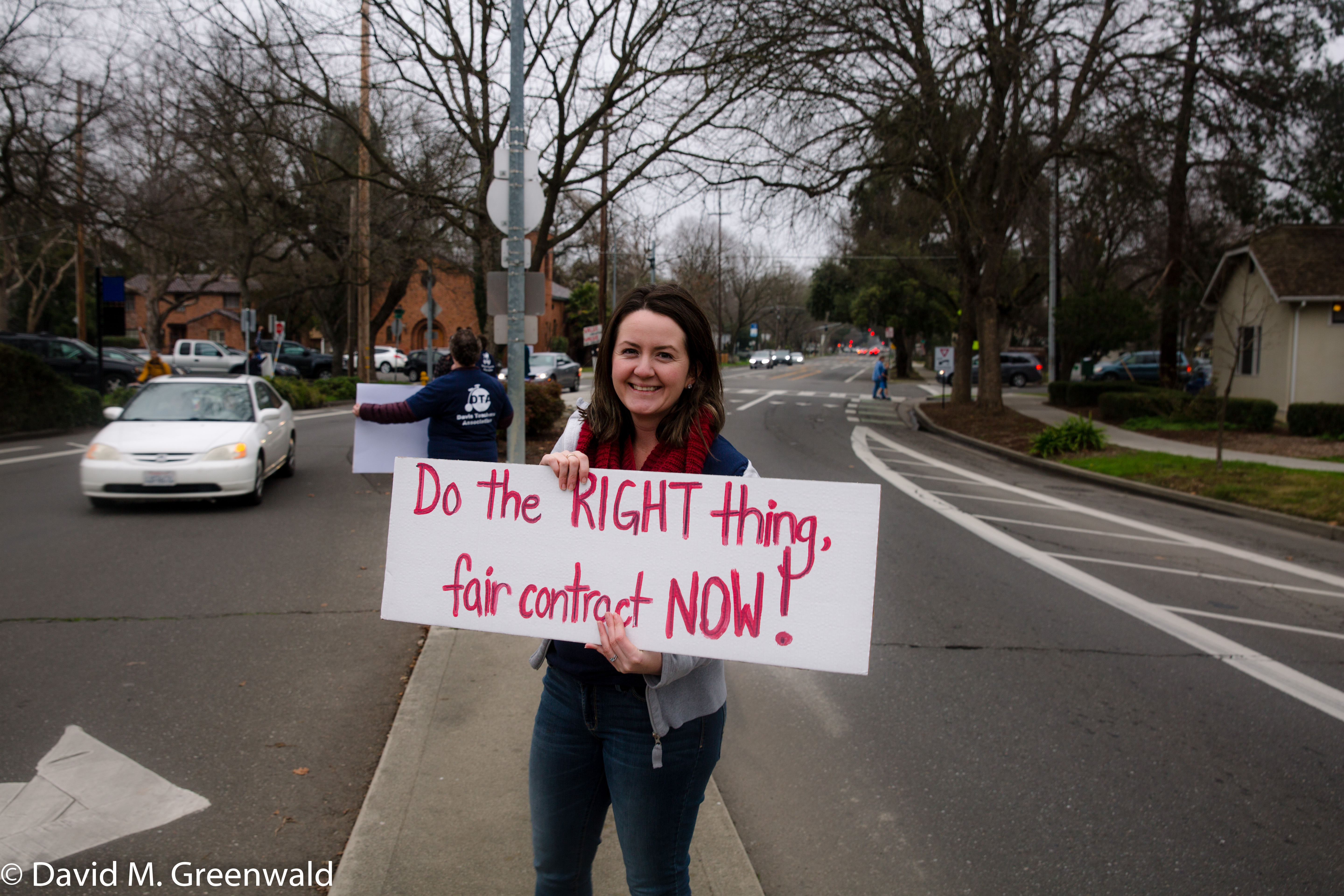
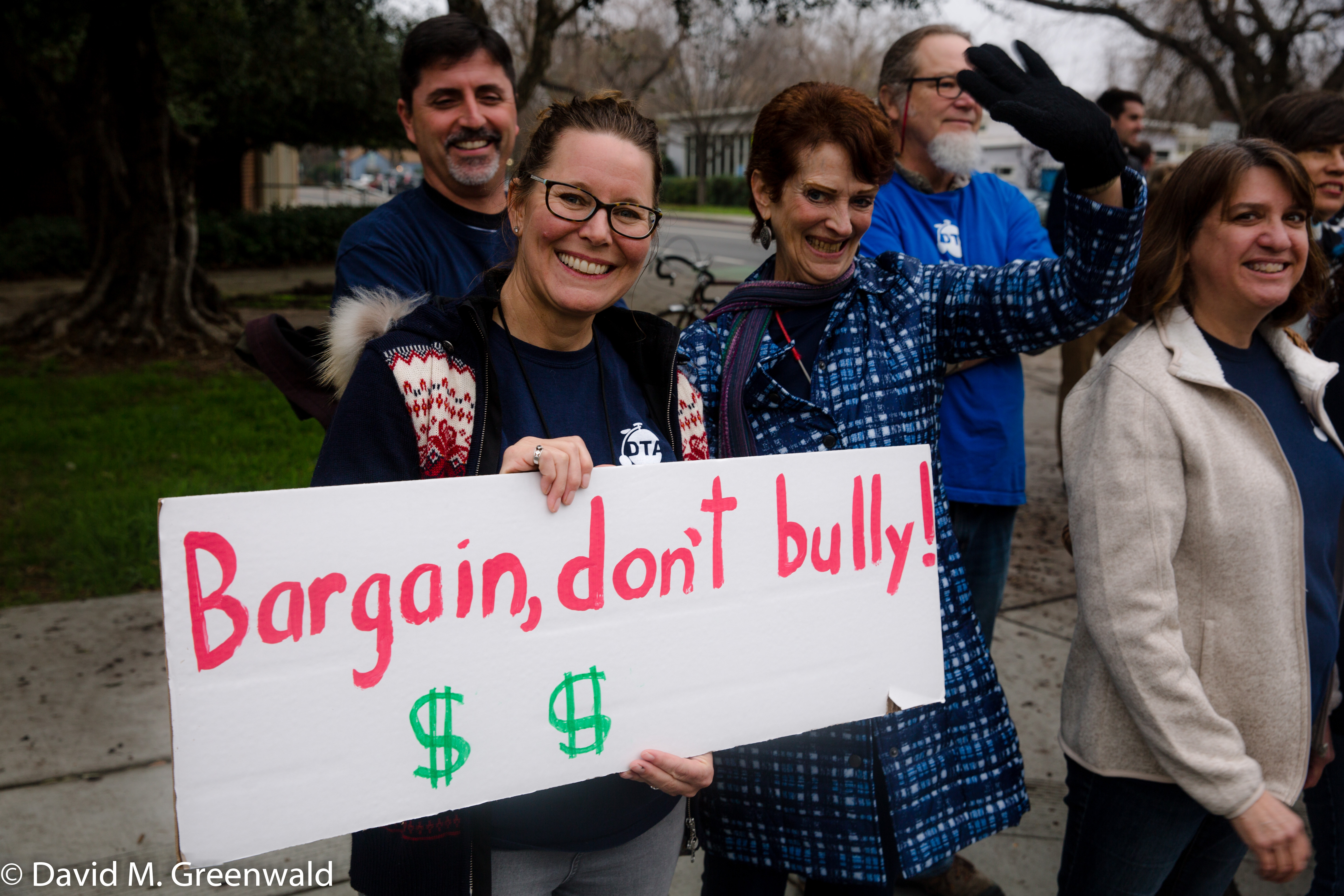
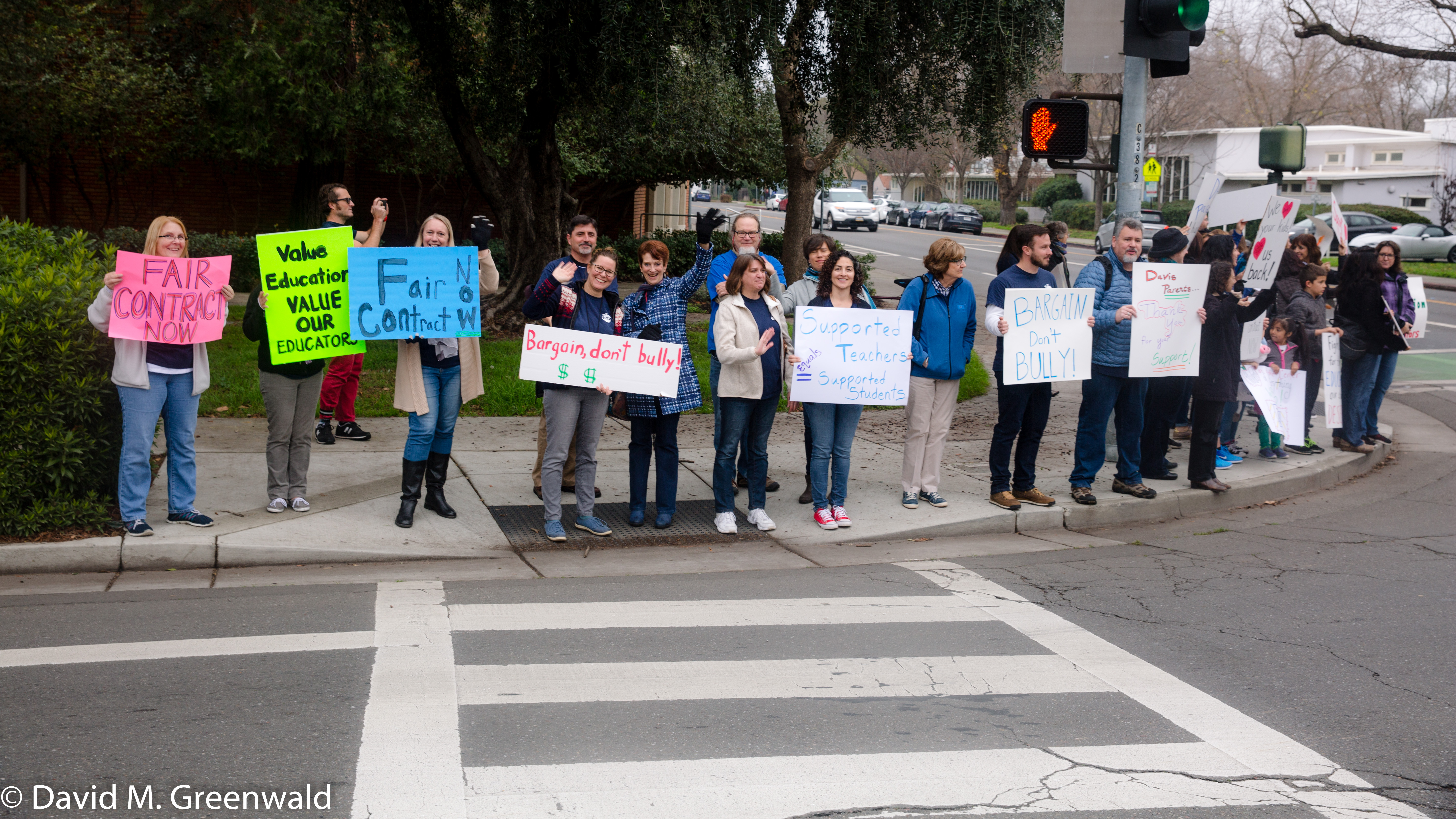
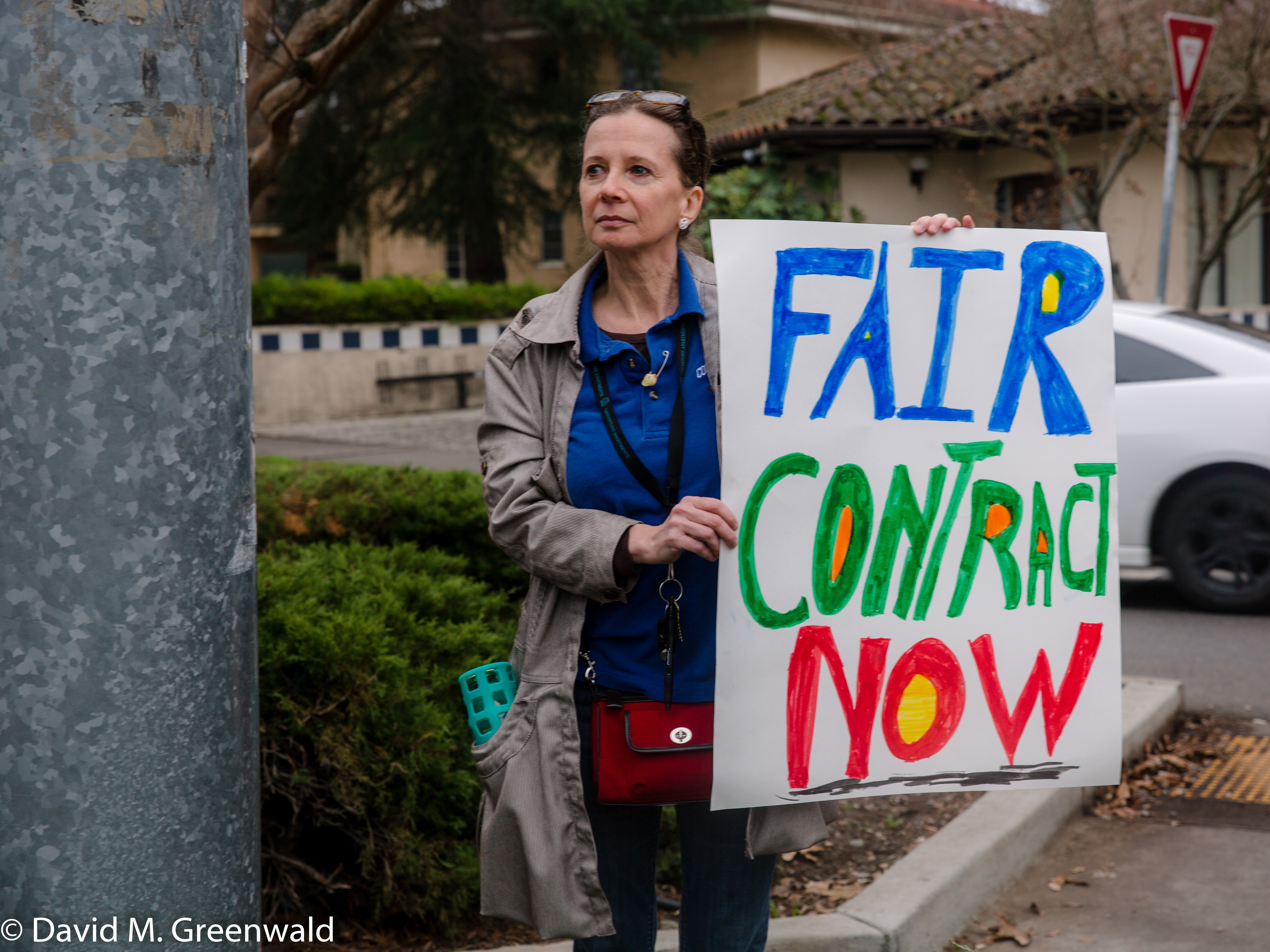
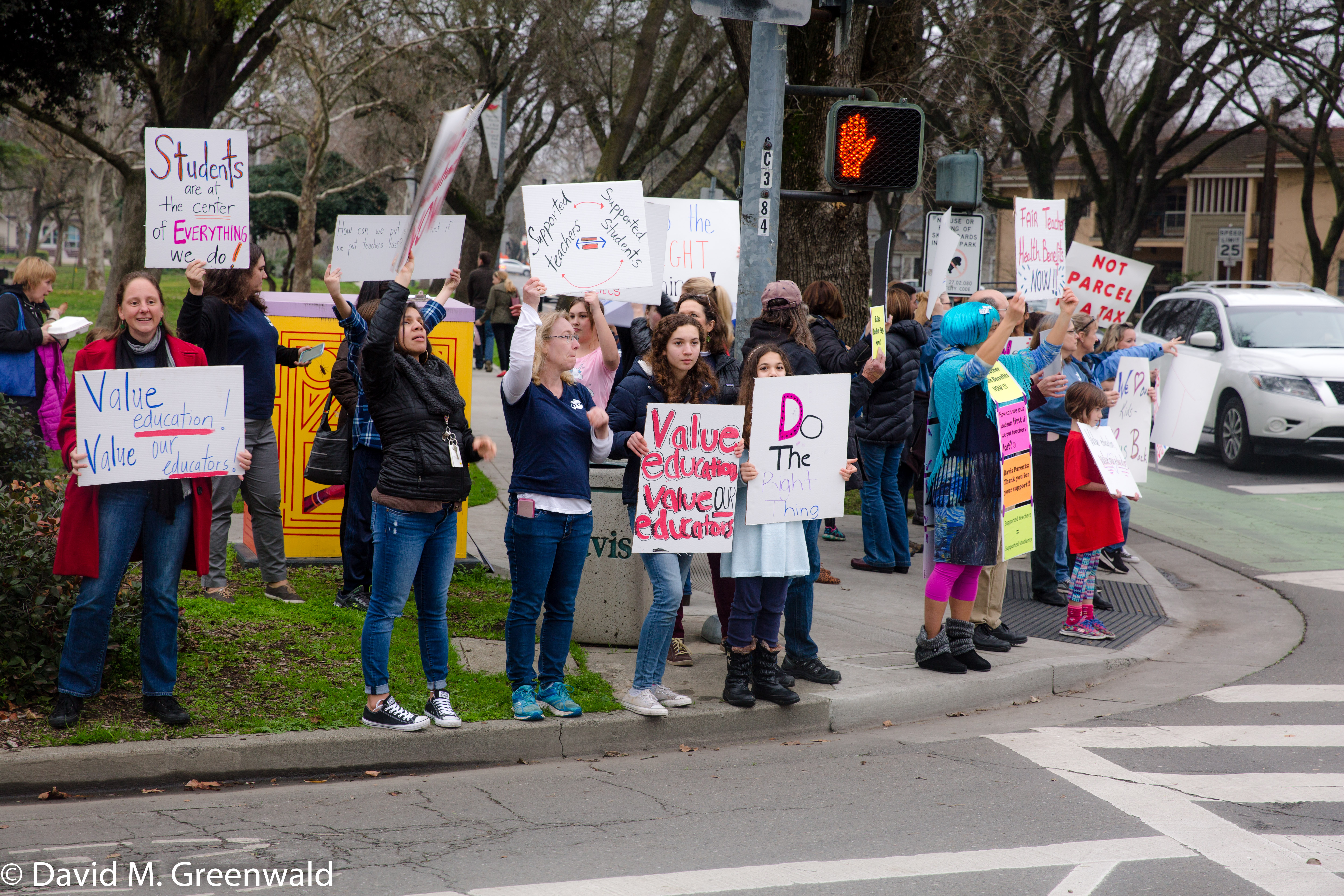
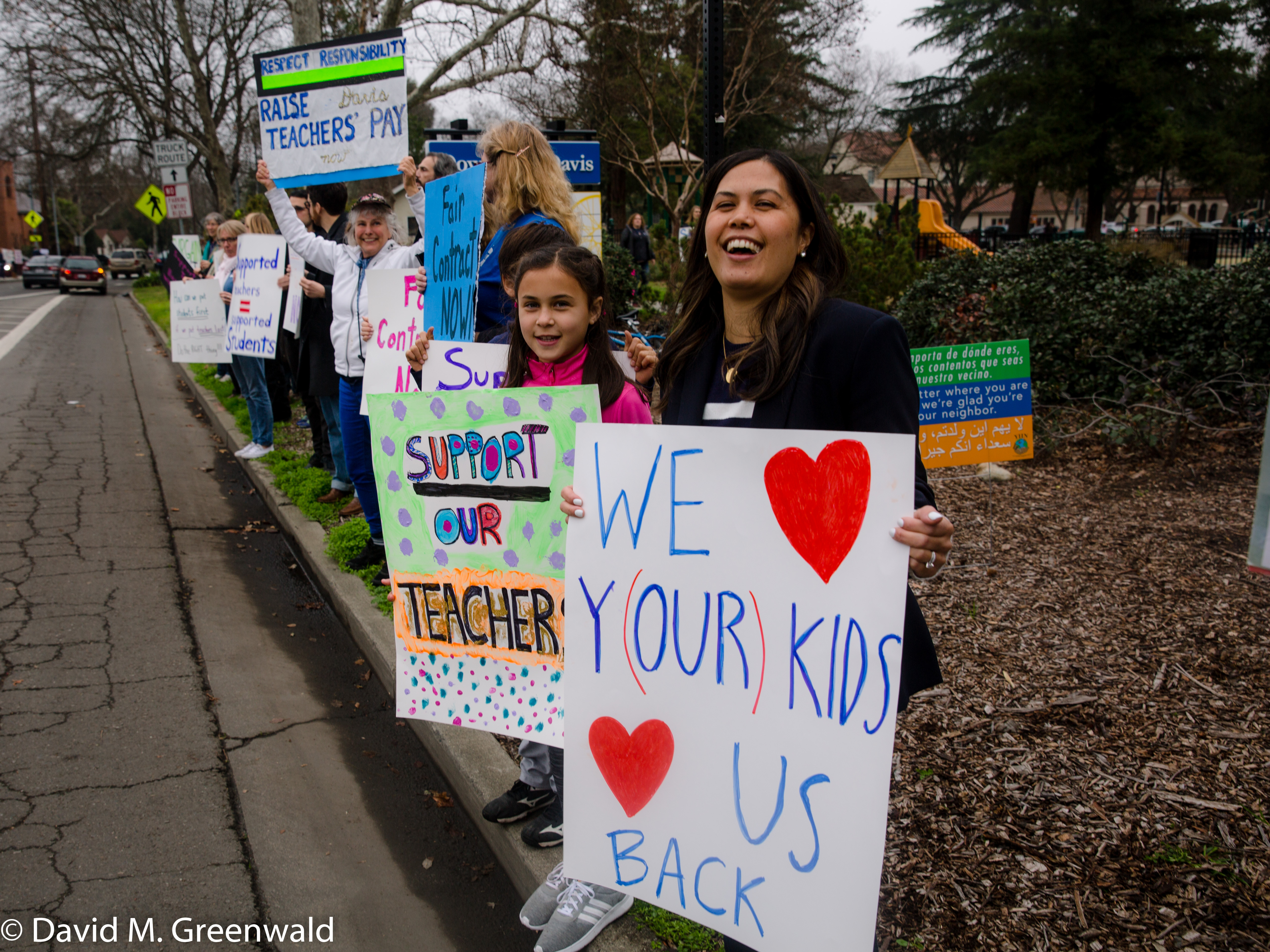
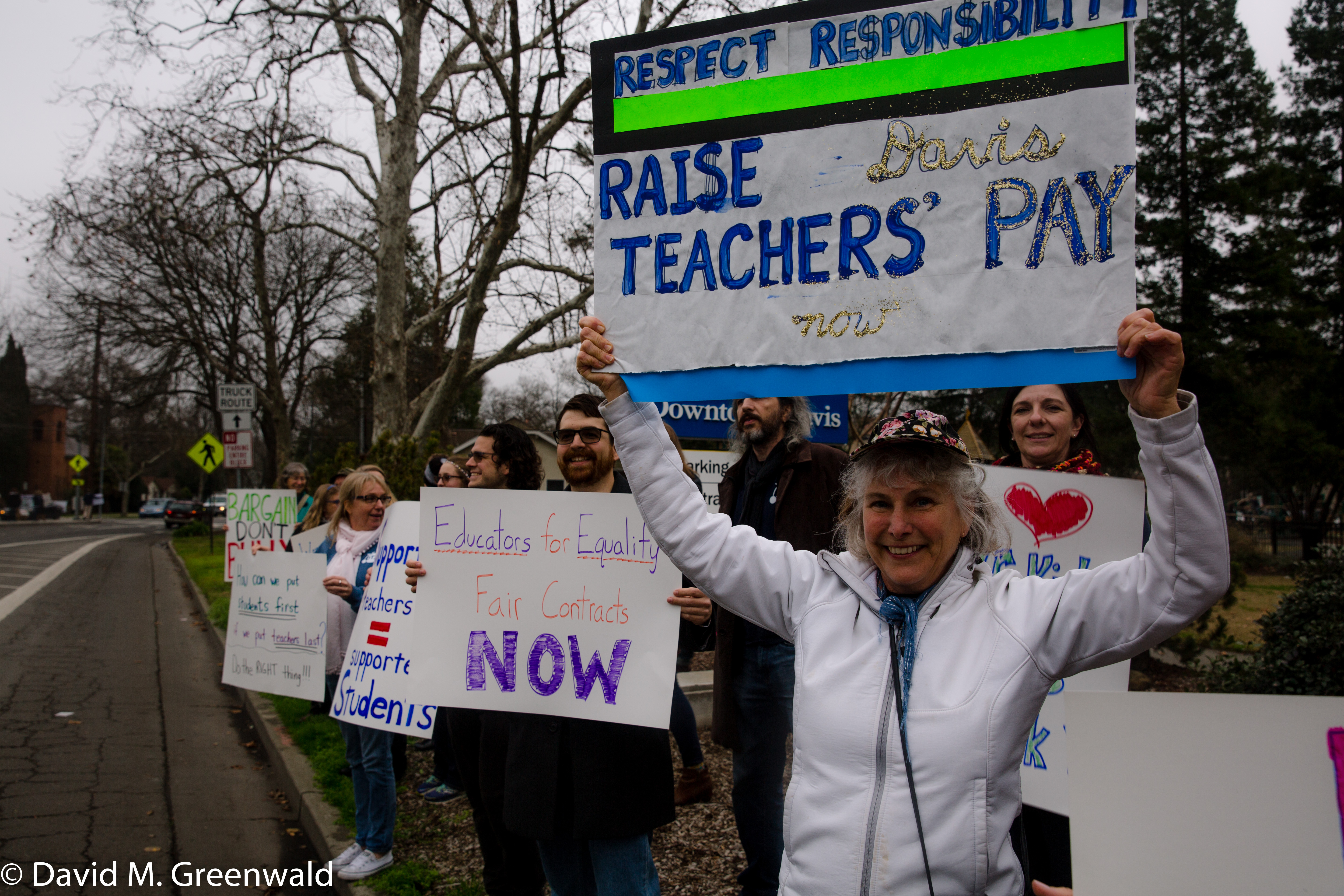

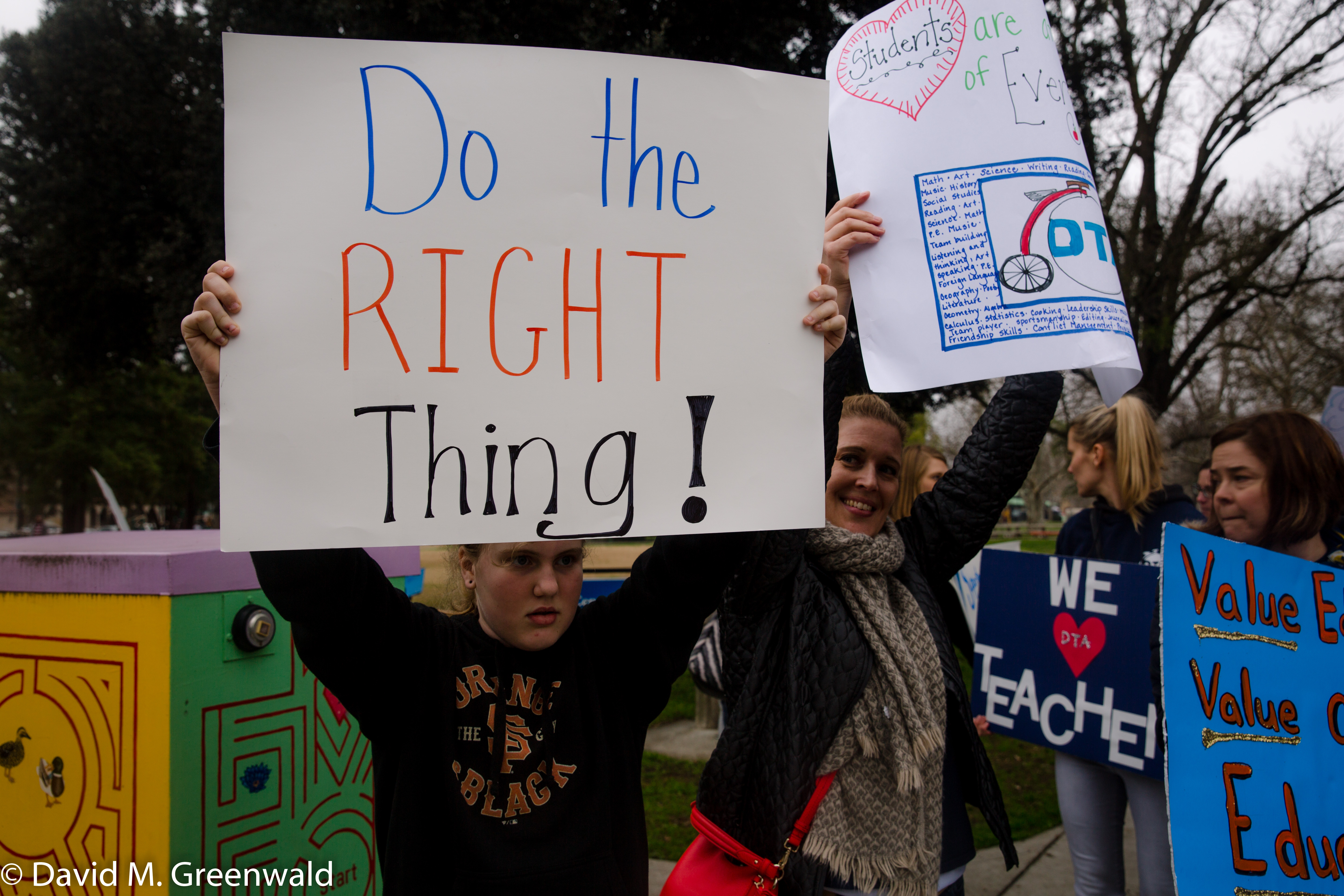


—David M. Greenwald reporting







First they want another parcel tax and now they don’t want any DJUSD employees that live in Davis to have to pay that tax. How about all the other residents who might find new taxes burdensome? Do they get any parcel tax exclusion?
So now what happens to the new proposed city taxes? The people will never vote for both. Heck, they might have hit the wall and not vote for any new taxes regardless if city or teachers.
“First they want another parcel tax and now they don’t want any DJUSD employees that live in Davis to have to pay that tax. ”
I think you have to be careful with pronouns, there are different “theys” here. Plus decisions have not been made.
Correct, but this is when these decisions need to be discussed, before they are made.
True, but I think it’s important to separate the “theys” here.
OK… being more precise with pronouns…
All your words, under the ‘headline’,
I can see where “they” is ambiguous…
That said, if the ParcelTax exemption is implemented for DJUSD, why not for City (City parcel taxes) and/or UCD employees? Slippery slope, no? Hope the trustees dismiss that concept immediately, and realize such a concept looks like a ‘brain spasm’.
BTW, am generally opposed to the ‘senior exemption’… particularly if not demonstrably based on ‘economic hardship‘… worse comes to worse, they could always do the reverse mortgage thing…
My read is that they would have to go through the legislature to make that even possible. They being the school district if the school board approves of it. I’m not sure how helpful a parcel tax exemption is to the teachers, although maybe it’s 1% or 2% of their salary, so perhaps that is helpful.
Keith
You have said exactly the same thing prior to every parcel tax for schools for as long as I have been on the Vanguard. And yet, the passage of parcel taxes for the schools remains high. I suspect what you are really saying is that you personally don’t want to pay more in taxes. I am fine with your personal opinion. I just wish you would leave “the people” and “the voters” out of it.
I have the same observation here as Tia. The last tax at $620 passed with like 71% of the vote.
That parcel tax just pretty much replaced a tax that had sunset. We’re talking more new taxation here. Where does it end? How much can the people of Davis endure. I think the voters might finally say enough is enough. Don’t forget that the city is coming after us for more taxes too.
It added about $100 to the previous two parcel taxes.
Note your arguments (elsewhere) about exemptions… where folk play, (vote) but do not “pay” … perhaps Keith should get a ‘conscience objector’ exemption… maybe he could (or does) take the existing exemption…
As Spock might say, “that would be logical”…
I assume you will never take the exemptions… feel free to donate for things you believe in… I do… voluntarily… I do have a problem with folk ‘volunteering’ me…
Howard
” I do have a problem with folk “volunteering” me.”
I understand the feeling. I have a great deal of difficulty with people “volunteering me” to pay taxes which go to killing non combatants in what seems to me to be a series of never ending wars that I do not perceive as making the citizens of the US safer in anyway, and many of us less safe. I resent it, and yet, pay my taxes I do. I have never opted out of any local tax, although I could. I strongly believe that as citizens, we have an obligation to pay for what we want. I want good schools and am ready to pay for them. The current federal administration is not in alignment with my values and frankly, I resent every dollar that I will send to this government, so I truly do understand.
So the talk is now pushing for a 50% only approval margin parcel tax proposed by a “registered voter” that could exclude all DJUSD employees along with seniors, people residing in affordable housing and all apartment renters in town. So what we’re doing in essence is narrowing the field of people that actally have to pay the tax and increasing the amount that homeowners would have to pay due to the smaller amount of taxpayers in the pool.
So with only a 50% threshold at what point do we end up with homeowners, the people who actually have to pay school parcel taxes, being outvoted by the majority of voters who don’t have to pay?
I don’t know. We can start by asking, what percentage of the voters are homeowners versus renters? How does the parcel tax vote break down owners versus renters?
Need to cut that finer, David… there are also ‘homeowners’ of rental property in town, who can’t vote, as they are not residents…
Mello Roos levies are based on “ownership” voters… probably the only aspect of MR law I support, philosophically. BTW, that’s why developers love MR… if imposed early, there is one, or a small # number of ‘voters’… knowing that once they sell property, others will pay the assessments (technically, NOT taxes) they get the funding benefit, but others pay… which I have repeatedly gone on record as opposing, practically. In a boom economy for housing, a buyer may well see a ‘benefit’ in lower initial cost… but at the end of the day, it is a “push” for the buyer.
One can “buy out” from City MR (we did, and glad, as those assessments were marginal, at best, for being deductible, and with the new tax laws…) but you can’t from the DJUSD MR assessments… just try… I did… and, when you fill out your tax forms in the future, understand that the MR assessment in your property tax bill, may be found to be an ineligible deduction… PSA.
Nobody should be exempt from parcel taxes.
Seeking a way to have interdistrict families pay the parcel tax is an excellent proposal.
And not just future school parcel taxes, they should also have to pay any that are currently on the books.
Right now, under current law, that would be illegal… but I think I agree, philosophically… part of that depends what they are paying for schools in their “home” districts…
Don
Not even in cases of economic hardship ? That sounds like a good way to create yet another group of homeless.
Really? Cite one, just one, example of that.
If levies of $1000/year cause one to forfeit their housing, they were already a sinking ship.
Not real. Get real… get past rhetoric… for homeowners, there is always reverse mortgages… the yearly assessments would probably be offset by increased home values…
Howard
I don’t pretend to know the ins and outs of reverse mortgages so that did not even cross my mind. But it is curious to me that you have routinely given people who talk about homeowners “not being able to afford to pay additional taxes” a pass ( such as Keith with his frequent comments about people reaching a breaking point without calling him out) but when I take him at his word and make a comment about people losing their homes, I am taken to task. Perhaps rightfully, but certainly not equally. I wonder why that might be ?
Tia:
There is a big difference between “not having the money” to pay an extra $1K a year and being forced to cancel their cable TV or sell some stuff on Craig’s List to pay the tax bill than the extra $1K in taxes forcing someone out of their home so they are “homeless” and living in a tent next to the railroad tracks…
Davis needs to admit that wealthy well educated people that can afford to live in Davis keep having a lot less kids than they did in the past and every year the number of wealthy well educated couples that decide they don’t want to have any kids goes up.
We could get rid of ALL the school parcel taxes (AND pay the teachers that are left more money) if the city were to “right size” and close a school and sell the site. If a bunch of Davis parents still want to educate kids from out of town nothing is stopping them from raising money and starting a charter school.
P.S. The headline should read “Some Teachers and a huge number of parents and students that they guilt tripped into joining them Take to Streets to Demand Better Pay, Benefits” (My wife and kids didn’t wake up yesterday excited to make stupid signs and hang out on a cold corner but felt they “had” to go)…
“We could get rid of ALL the school parcel taxes (AND pay the teachers that are left more money) if the city were to “right size” and close a school and sell the site.”
That’s not even close to being correct for a lot of reasons.
The ignorance that some folk have about the “City” being the “school district”, amazes me. And gives a bad clue about “public education”… I keep trying to be charitable, and try to believe they are transplants, from other states, where the cities/towns also are the school district…
That is one of the many reasons I believe you allude to, David… I picked the “no brainer” one… low hanging fruit as it were…
To me the easiest problem is that it’s not clear that the district isn’t “right sized”
Even if that were a problem… By right sizing, you might save on the margins by cutting support staff, but you’re not going to generate millions in savings that a parcel tax generates
Furthermore, selling the property would generate facilities money but not money you can use in a classroom and even if you could, it’s one-time money and so it wouldn’t work for ongoing expenses.
I didn’t say “the city is the school district” I said if the “city” (of Davis) has one less school the people that live in the city (and pay parcel taxes) will not need to pay them anymore since if the school district closes a school and sends all the out of town kids back to their home districts they will need a lot less money every year. Howard and Davis may disagree with closing a school but if you say it is “not even close to being correct” or “ignorant” it shows that you both have no idea of 1. how many out of town kids go to school in Davis every day and 2. the cost to run a school site and/or the value of a Davis school site…
Ken
It sounds like your wife and kids gave up their own agency voluntarily on this one. I am sure that no one made them “make stupid signs and hang out in the cold. It is up to each one of us to decide on which issues we will take a stand.
http://educationnext.org/bad-bargain-teacher-collective-bargaining-employment-earnings/
Here is how it should work.
Teachers want a raise?
Then provide more service value to justify a raise.
What if they are providing more service value than they are receiving as it is?
That is also true of any employee, public or private… a good point, nevertheless… ‘value’ is often hard to measure, and can be arbitrary, in any field…
Have education outcomes for our poor and minority students improved? Has the school district come to the table with commitments for improvements that would justify spending more money?
The education system is in the upside down world. In the right-side up world there are commitments made for improvements to justify an investment and any increase in cost.
The education system never makes commitment that they can be held accountable for. It is always someone else’s responsibility of fault. Not spending enough! Bad parenting! Too many children just don’t want to learn! Too many children with behavior problems! But, unless you give us more money things will get worse!
I don’t think Davis teachers in general are underpaid given the value of their total benefits package including their job security and the fact that they only work 9.5 months per year. This comparison to other districts is BS when the other districts are dealing with a much higher percentage of non-gifted/talented students that derive from our highly educated family gene pool. Frankly, teaching in Davis is easier… just throw a book and assignments at the kids and their highly-educated parents will take over making sure little suzzy and little johnny do well.
You’re analysis is starting on the wrong end of the spectrum here. The first question you have to ask is not whether the educational outcomes have improved, the first question is whether teachers are being fairly compensated for their current value. And the answer quite clearly, at least to me, is no.
Pretty good points. But, we’re dealing with a “Union”, with State/national ties.
Please note that there was no evidence of promoting non-credentialed folk (not talking about senior/mgt Admin) having their boats float. It’s all about the teachers (union), and they couch it as “all about the kids”…
No problem have they (Yoda) in ignoring custodians, grounds crews, secretaries, etc., who do not belong to THE UNION. It’s “all about them”, yet the facts are they are a PART of a district where the “rank and file” may also well be below par in compensation. Not just the teachers.
If non-credentialed (classified) staff documented they were 10-15% below market, would anyone care? I would.
Yes, I abhor ‘unions’, particularly in the public sector…
Jeff
I do not know what version of Davis you live in that you think that only economically or genetically ( Really ? Did you really say “gene pool” ? ) privileged children attend Davis schools. I volunteered in the Davis public schools for 15 years and can guarantee you that this is not the case.
Everyone knows that ALL of the students in Davis schools are not from wealthy (or well educated) families, but with a median home price of close to $650K, high rents and a population that looks down on people that didn’t go to the “right” colleges Davis has a higher than average percentage of kids whose parents are both wealthy and well educated (at top 20 schools). Another reason for cutting back on transfer students is that most (but not all) kids whose parents didn’t go to college (and come to Davis with parents working as janitors and cleaning ladies every day) will be harder to teach than kids who live in town whose parents have Ivy League PhDs and teach at UCD (who almost all pay lots of money for educational programs, educational toys and extra tutoring from birth until their own kids are out of grad school)…
Jeff
I agree with you on this one. However, as I am sure you know, the devil is in the details. How is “service value” to be measured and implemented ? What is a realistic timeline to change from seniority to outcomes as measures ? I have some ideas having made the change from a fee for service mindset to a compensation for results mindset in medicine over the past 30 years, but would like to hear your ideas since it is your assertion.
There is a lot that is unclear and possibly faulty in this article. If this article is a summation of a longer paper, I don’t find a link to such a paper. It doesn’t appear to be a peer-reviewed article. Peer review would probably have caught these points.
They show measurable shortcomings in students from states with “duty to bargain” laws, but then refuse to show how those measures compare for students educated in alternative systems, saying there are too many other factors in play to do that. Yet would those same confounding factors that make that comparison inappropriate might well be factors that account for the defined underperformance for DTB states. There is reference to data manipulation but the authors don’t explain it.
In evaluating outcomes in adults who went to school in DTB states, it appears that the comparison is being made against a population of all adults, including those with tremendous wealth who went to more expensive and mostly inaccessible private elite college prep type schools. That means that the earnings of many wealthy billionaires with legacy wealth who went to such schools (Bill Gates, Trump, Tom Steyer, Koch Brothers, Jamie Dimon, Reed Hastings, etc.) is included and weights the average upward.
IMO a better article would anticipate and address some of these more obvious skeptical angles.
There is a difference/nuance, from collective bargaining (which might be “meet and consult”/”meet and confer”) with a group of non-unionized employees, and collective bargaining with unions who often have State or National affiliations with ‘master unions’. Like CTA (or NTA?), in the case of CA public school teachers, specifically DJUSD.
Perhaps your premise of your comments is confined to “public schools”? An arm of ‘government’? Don’t think it applies to private nor parochial schools…
Your contribution is appreciated. Made me curious to find the publication you mentioned.
This is a response to Jeff M’s comment above, where the link is to be found.
Noted… thanks… am playing ‘catch-up’ this morning…
Not paying to educate an increasing number of out of town kids is not just going to “save on the margins” it will save MILLIONS (unless you want to argue that getting rid of one school and the costs to educate ~600 out of town kids every year in a district that currently has ~8,000 kids and ~$85mm budget WON’T save millions)
http://www.sacbee.com/news/local/education/article139244218.html
That’s not true, because the district gets ADA money for them. That’s why they do it.
But most have acknowledged that ADA is much less than “breakeven”…. if ADA was breakeven, we’d not need parcel taxes…
Right the biggest problem right now is that the state disadvantages districts like Davis in LCAP money. With the parcel tax, the district is able to get up to average funding. It used to be that the parcel tax gave the district a funding advantage, that’s no longer the case.
So removing the transfer students isn’t going to eliminate the need for parcel tax, especially if the district is looking to increase teacher pay.
Don’t forget that just like almost every city in CA almost every school district in Ca has a MASSIVE amount of unfunded deferred maintenance. By reducing the number of school sites you will save millions in just future maintenance and renovation costs…
P.S. I’m not talking about David, but I find it interesting that most (but not all) of the people out on the corner with my wife holding signs yesterday want to see the DJUSD keep growing but are opposed to ANY growth at all in the city (Nishi, Trackside, Covell Village, Wildhorse Ranch etc)…
I’m wondering if David can “show his math” so we can see how he came to the conclusion that closing a school and “removing the transfer students isn’t going to eliminate the need for parcel tax”…
Because there is a gap between what the district gets from the state in ADA per pupil and what they spend per pupil that is closed by the parcel tax. I was trying to find Bowes discussion from last year where he talked in terms of percentages, but it’s somewhere on the web, perhaps even on the Vanguard.
Ken A –
The reason why closing a school isn’t a solution is that the interdistrict transfers are scattered across school sites and across grades.
So, let’s say that there are 30 interdistrict transfers in the 4th grade scattered across all of the elementary schools in Davis. What the means is that we have 1 extra classroom of students and technically we could close down a classroom and save the salary of that 1 teacher. But, practically, closing down a classroom would actually entail finding an already existing classroom, disbanding it, and scattering those 4th graders across the district’s remaining 4th grade classrooms to fill the spots that the interdistrict transfers would have filled.
This would mean telling an already existing 4th grade classroom full of students that they will be assigned to a different school. I am not saying that this is impossible, but one can see why it would be very unpopular.
Also, the district receives approximately $7692 ADA dollars per student. So, by closing the classroom, the district would lose about $230,760. That’s far greater than the savings from cutting one teacher.
In general larger districts fare better than smaller ones. For example, the cost of 1 superintendent would be shared across a greater number of students so the ADA dollars can stretch further. We need to be growing our district, not shrinking it.
Ken: I found what I was looking for: “As Mr. Best explained, the basic problem is that state funding through ADA (average daily attendance) and LCFF (Local Control Funding Formula) only comes to 87 cents on the dollar. The district then makes up an additional 11 cents through the local parcel tax, but that has left two cents on the dollars as a “short fall” and he says over a 20-year period those numbers add up and partially explain why the district has fallen short on compensation.”
So here are the numbers:
650 intradistrict transfer students out of 8570 or 7.6%
the parcel tax funds about 11% of the general fund money and that’s what makes up the gap between ADA and LCFF and what the district spends
So in the best case scenario you might be able to reduce the parcel tax by $50 if you eliminated the intradistrict transfers. On the other hand, perhaps the better solution is to have the transfers simply pay the parcel tax. Either way it’s not going to solve the problem.
Using Cindy’s number of $7692 ADA dollars per student and a number of ~400 students for MME is income of just over $3 million.
If MME closed and with a combination of early retirements, layoffs and teachers going to what we have been told are neighboring districts that pay more the district will save ~$8 million a year in salaries, benefits, health care and CalSTRS payments for the ~80 people that work on site.
The district will also save quite a bit more if they don’t have to heat and cool and maintain the site, and can get even more money if they lease it (I’m wondering if David can tell me who will get the $1mm + per year if the site is leased).
Feel free to plug in actual salary and benefit numbers and/or the actual annual PG&E, Water, Trash, and R&M/CapX numbers for the site but there is no way that the district will not save millions and millions of dollars every year by closing a school (even if they don’t get a penny from leasing the site).
The first problem is that you are failing to understand that if you eliminate a school and don’t eliminate the students, the students just go somewhere else. So you might save the marginal administrative costs, but not much else.
Second, if you eliminate the transfer students (650) of them, then you get the 11 cents on the dollar as savings. That’s some money, but it’s not a lot.
Third, I don’t know where you are getting the $8 million figure, but I don’t think that’s even close accurate. The calculation is much more simple. You calculate the difference between the actual per pupil amount spent and the ADA amount, that amounts to 11 cents on the dollar and then multiply by the number of students eliminated from the school district.
Fourth, I don’t know where you are getting the figure of $1 million if the site is leased per year. That seems high. But even so, the money would go into the facilities fund, not the general fund. So it can’t be used in the classroom per state law.
First, David is correct that “the students will go somewhere else” they will go back to their home districts (and the people of Davis won’t have to pay for them any more) since DJUSD only has to take them if they have the space.
Second We will get a LOT more than 11% if we close a school, David is correct that the “parcel tax” is 11% of school funding but the “shortfall” between ADA (aka LCFF) money and what DJUSD spends is 24% (actual budget is on the link below):
http://djusd-ca.schoolloop.com/file/1368362980686/1500711361675/2722255027640397543.pdf
The 24% (not 11%) shortfall is not evenly spread out per kid, bigger schools like DHS have less fixed cost per kid than the smaller schools. To figure out the savings of closing a school you need to the total cost to keep a school running per year less the income per year (hint it is WAY more than 24% for the smaller schools).
Third the city of Davis has a TCOE of over 100K per employee and with the rising cost of healthcare and pension contributions I’m pretty sure it costs at least $80 million to cover the TCOE for the 80+ people that work at MME. If you “calculate the difference between the actual per pupil amount spent and the ADA amount” you would have your number “only” IF YOU DIDN’T SAVE MILLIONS MORE BY CLOSING A SCHOOL…
Fourth paying $1 million a year (with an annual CPI bump) to lease a site where you could build 400-500 apartments (that had gross revenue of ~$8-$10 million) is probably s low estimate. Call a couple commercial RE guys and post what they say if you think I am way off.
It is OK to say that you want the people of Davis to pay millions in parcel taxes so hundreds of out of town kids to go to school here, but don’t lie and try and to trick people into thinking the out of town kids don’t cost much”…
“Second We will get a LOT more than 11% if we close a school, David is correct that the “parcel tax” is 11% of school funding but the “shortfall” between ADA (aka LCFF) money and what DJUSD spends is 24% (actual budget is on the link below)…”
You need to talk actually to the district, the information you are giving out is incorrect. You are correct that the LCFF money accounts for just 76% but, the rest of the money is based on ADA and is dependent on student population. The numbers I gave were directly from the school district.
The MME web site lists about 80 employees with less than half teachers.
If the site were to close the school district would not only save millions on all the site specific costs of running the school year after year but could lease (not sell) the site for over a million a year (with the lease rate going up every year) if the city would zone the site in a way that it made sense for an apartment developer. This is all “in addition” to any savings in the difference between state ADA money and what the district actualy spends to educate out of district kids.
You don’t gain more money than what I showed you the calculation of because 87% of the “savings” is offset by a decline in revenue, so you only gain the 11%. Second, leasing the site would not go to general fund expenses.
End 7th period………………………….
“Matt Best estimated that it would save about 3 to 3.5 FTE or $180,000 a year to cut seventh period at Davis High School. He estimated another $300,000 if you cut seventh period from the junior highs.”
They need $4 million to close the gap.
End 7th period………………………….
The school parcel tax designated money to fund 7th period. Voter approval locked in that piece of the program.
Just end it, we can’t afford it any longer.
End what exactly? The parcel tax?
And, to augment David’s point, who is “we”?
I might choose to end it or defund it (philosophically… might want to spend the funds elsewhere), but I feel sorry for you that you apparently can’t afford it… that’s rough… sign up for “go fund me”? Might actually make a donation if you posted your full name… don’t want you or yours to go homeless…
Ending 7th period (and the corresponding variety of classes available because of it) would mark a degradation in the quality of education.
It seems it wouldn’t save nearly enough money to justify throwing out the current system.
has anyone ever noticed only a handful of schmows rarely post? more later
ever notice ANYTHING I have ever posted is removed
I had noticed an elevated level of comment.
Interesting thought… is it teacher compensation or public school teachers? Profession, performance and qualifications, or the fact that they are unionized public employees?
Most private/parochial school teachers have employers who cover 100% of medical for the employee… zero for dependents. Think that is a minimum baseline.
Public employees (non-teachers), until the last 5-6 years, covered employee + 2 plus, under the aegis of PERS (Kaiser rate). City employees have since picked up more and more a part of that. Would be OK with DJUSD going to that with similar contributions like Davis employees make.
As to salary, hard to compare… suspect that the average parochial school teacher is as competent, performs as well, and requires same education, certs (CLAD, etc.) etc. as those in the public sector. Yet salaries are far less… like 1/2, 5/8. At least that was true of my spouse.
Funny how some of those who want to compare DJUSD teacher compensation to other public districts, don’t seem to be concerned about classified employee compensation, nor as regards to municipal employees. ‘Tis a puzzlement. Or, an ‘unconscious bias’?
DJUSD have a very extensive ladder/step range… guaranteeing 2.5% increase/year until they ‘top out’, not based on ‘performance’, other than “keeping their noses clean” (see DJUSD website).
I’d rather see the district and DTA focus on the benefit side ,[helps new teachers as much as ‘old-timers… (more, proportionally)… an inconvenient truth that DTA does not seem to stress, both for recruitment and longevity] and not the salary. (assuming the costs of doing both may not pass a vote).. but I’ll have no say on details. Will be a matter of yes/no for a parcel tax to fund teacher compensation increases (as far as ‘my say’)… but lack of same concern for classified employees, no increases in salary beyond CCI, (“with a cap” in case we go back to the ’70’s) will inform my vote. If it comes to that.
I had heard that the CSEA has a “me too” bargaining clause so they benefit from what the DTA negotiates.
Which raises some questions… the teachers’ argument is that their compensation (both salaries ) are significantly lower than comparable districts in the area… wonder if that is true of the classified DJUSD folk… is the classified folk turnover similar to that the teachers cite? Do they have problems with recruitment?
Am not looking for you to have the answers, Cindy, but DJUSD should be able to…
Interesting article regarding the financial challenges that school districts throughout California are facing. Once again, Davis is not alone. (Also, note the increased contribution required from school districts, for unfunded pensions.)
https://www.eastbaytimes.com/2018/01/17/california-schools-painful-cuts-around-the-corner-despite-windfall/
Except that they are unique in many respects that you summarily ignore with your comment.
Well, don’t increased contribution requirements toward unfunded pensions impact all school districts in California?
Here’s another possible similarity from the article above (though I realize the amount per student might be different in Davis):
And, here’s an example of a district that is choosing a different solution:
To your first point… to varying degrees… same for cities/counties/State… it depends, as to severity of the underfunding… some districts are not even under CalSTRS… some of them have their own problems…
[SS is underfunded]
No comment on the rest…
I’m still wondering if there’s been any consideration of a 4-day schoolweek (with slightly longer days). Less extreme, than shutting down schools.
Would have been “mighty popular” with me (and my classmates), back in the day. Probably some teachers, as well.
I’m still not commenting, regarding potential salary increases. However, I suspect that the proposal may not sail through as easily as some are hoping for. (If it fails, I suspect that it will be due to a perception that districts have not fully explored other options to deliver education more efficiently. In other words, it might have nothing to do with what voters believe that teachers “deserve”, for the service that they perform.)
For example, I agree with Jeff that school districts have not taken enough advantage of technology, to deliver education more efficiently. (And, I suspect that school districts are resistant to change.)
Ron, it has been considered over the decades.. it would NOT work for the 40% plus who are Gifted and are driven to SF for lessons in the afternoons, those who take buses to SF STATE or SAC City or UCD while simultaneously completing elementary to DHS, also the folks who WORK to help support their families, and also the huge chunk on the bottom of the scales, who go from remedial classes to aftershool help to make it up to common core level..
A huge percentage of children would not be able to do everything else they do on a 4 day school day….
Many might have NO OPTIONS and would likely drop out, head to a private school, etc…
Marina Khan January 20, 2018 at 3:29 pm
Ron, it has been considered over the decades.. it would NOT work for the 40% plus who are Gifted and are driven to SF for lessons in the afternoons, those who take buses to SF STATE or SAC City or UCD while simultaneously completing elementary to DHS, also the folks who WORK to help support their families, and also the huge chunk on the bottom of the scales, who go from remedial classes to aftershool help to make it up to common core level..
A huge percentage of children would not be able to do everything else they do on a 4 day school day….
Many might have NO OPTIONS and would likely drop out, head to a private school, etc…
Click to Edit – 4 minutes and 29 seconds
Reply Report comment↓
Marina Khan January 20, 2018 at 3:29 pm
Ron, it has been considered over the decades.. it would NOT work for the 40% plus who are Gifted and are driven to SF for lessons in the afternoons, those who take buses to SF STATE or SAC City or UCD while simultaneously completing elementary to DHS, also the folks who WORK to help support their families, and also the huge chunk on the bottom of the scales, who go from remedial classes to aftershool help to make it up to common core level..
A huge percentage of children would not be able to do everything else they do on a 4 day school day….
Many might have NO OPTIONS and would likely drop out, head to a private school, etc…
Click to Edit – 4 minutes and 29 seconds
Reply Report comment↓
Marina:
You’ve pointed out some reasons that it may not work well for some. (Not sure what you’re referring to, regarding the 40% who are driven to SF for lessons.) In any case, it may work well for others. (Might even match a parent’s work schedule more closely.)
Here’s an article that I posted regarding a 4-day schoolweek that has been implemented in Oklahoma. I believe that other states are also looking into this.
http://kfor.com/2017/02/07/four-day-school-week-paying-off-for-local-districts-lawmakers-want-a-change/
It may be that parents, teachers, and school districts will have to demonstrate more flexibility in general, especially as fewer households have children (and are supporting those that do). However, I suspect that any significant change may be resisted, even if it offers advantages. (That is, unless there’s no viable way to avoid it.)
As another commenter has pointed out, technology may also provide a more efficient way to deliver education, if allowed to do so.